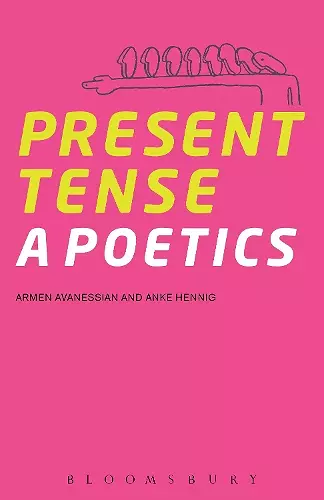Present Tense
A Poetics
Armen Avanessian author Dr Anke Hennig author
Format:Paperback
Publisher:Bloomsbury Publishing PLC
Published:5th Nov '15
Currently unavailable, and unfortunately no date known when it will be back

Describes how the present tense was invented and why the poetics of the present tense novel is essential for an understanding of contemporary literature and the evolution of the novel since modernism.
The invention of the present-tense novel is a literary event whose importance is on par with the discovery of perspective in painting. From the first novels shaped by interior monologues and the use of the present tense in the tradition of modernism, the present tense has, over the course of its century-long evolution, changed the conditions of fictional narration, along with our conceptions of time in a philosophical and linguistic framework. Indeed, to understand the work of an increasing number of contemporary writers – J.M. Coetzee, Tom McCarthy, Thomas Pynchon, to name only a few – it is necessary to both understand the distinct linguistic and literary qualities of the present tense as well as its historical transformation into a genuine tense of contemporary storytelling.
For the first time in literary scholarship, Present Tense: A Poetics offers an account of a profound development in 20th- and 21st-century fiction.
This book renews attention to poetics as a worthy field of literary studies by offering a thorough and systematic examination of the narrative and philosophical significance of tense. The manner of delivery is engaging even as it remains scholarly. Fresh, at times daring, in its propositions, this work will no doubt provoke interest and generate discussion. * Galin Tihanov, George Steiner Professor of Comparative Literature, Queen Mary, University of London, UK *
Combining linguistics, literary theory and philosophy of time — in particular utilising Gilles Deleuze’s three paradoxes of the past and Gustave Guillaume’s language theory — the authors deliver a sound technical analysis of the development of the novel. Claiming that ‘only language has the power to define the boundaries of the present,’ they produce an innovative and integrated fiction-narratological approach that can be used to identify the characteristics of the altermodern novel. … Spanning a range of avant-garde writers, philosophers and linguists from Britain, the US, Russia, France, Italy and Germany, this study presents a fascinating insight on temporality and tense-patterns in narrative, demonstrating how the past can be as unpredictable as the future. -- Angel Dahouk * The Morning Star *
Avanessian and Hennig explore the use of the present tense in novels of the late 20th and early 21st centuries. Specifically, they borrow the art-theoretical term ‘altermodern,’ first used by art scholar Nicolas Bourriaud, to categorize contemporary novels that employ a new understanding of the present tense, one that marks a break with previously published present-tense novels that employ classical narration. Avanessian and Hennig further argue that the altermodern novel reflects a new understanding of the novel's relationship to time and changes the reader's understanding of the relationship between narration and time. ... [T]he book includes some smart, well-articulated readings of novels. In fact, one of the strengths of this book is the use of exemplary passages from novels written in English, French, German, and Russian; this study does a great job of broadly surveying novels from many traditions. Summing Up: Recommended. Graduate students, researchers, faculty. -- J. J. Donahue, SUNY Potsdam * CHOICE *
How do we account for the widespread use of the present tense in contemporary narratives? What has happened to our understanding of time if a fundamental tenet of fictionality—the idea that narratives make present something that happened in the (real or imagined) past—seems no longer operative? Drawing on narratology, cognitive science, deconstruction and philosophy of language, Avanessian and Hennig reconceptualize the relation between time and narrative; what is more, they rethink poetics as an expanded cultural theory concerned with human world-making. An impressive tour de force. * Andreas Gailus, Associate Professor of German, University of Michigan, USA *
ISBN: 9781628927641
Dimensions: 212mm x 138mm x 20mm
Weight: 400g
304 pages